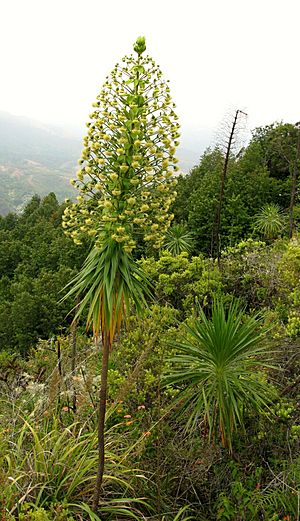Wilkesia facts for kids
Quick facts for kids Wilkesia |
|
|---|---|
 |
|
| Wilkesia gymnoxiphium | |
| Scientific classification | |
| Kingdom: | |
| (unranked): | |
| (unranked): | |
| (unranked): | |
| Order: | |
| Family: | |
| Subfamily: |
Asteroideae
|
| Tribe: |
Madieae
|
| Genus: |
Wilkesia
|
| Type species | |
| Wilkesia gymnoxiphium A.Gray, 1852
|
|
Wilkesia is a small group of plants that grow only in Hawaiʻi. These plants are part of the sunflower family, which is a very large group of flowering plants. Specifically, Wilkesia belongs to a special group called the tarweed-silversword tribe. There are only two types of Wilkesia plants, and both of them are found only on the island of Kauaʻi. This means they are endemic to Kauaʻi, which means they naturally grow nowhere else in the world.
These plants are also known as perennials, which means they live for more than two years. Wilkesia is part of a larger group of Hawaiian plants called the silversword alliance. The genus Wilkesia was named after Captain Charles Wilkes, who was an American explorer.
Contents
What are Wilkesia Plants?
Wilkesia plants are unique members of the sunflower family. They are known for their interesting shapes and how they grow. These plants have adapted to the special environment of Kauaʻi.
Types of Wilkesia Plants
There are two main types, or species, of Wilkesia plants that scientists have identified:
- Wilkesia gymnoxiphium: This species was first described by a scientist named Asa Gray in 1852.
- Wilkesia hobdyi: This species was described much later, in 1971, by Harold St. John. It is sometimes called the Dwarf Iliau.
Plants Once Called Wilkesia
Sometimes, scientists change how they classify plants as they learn more. One plant, Wilkesia grayana, was once thought to be a Wilkesia. However, it is now known as Argyroxiphium grayanum and belongs to a different group within the silversword alliance.
Where Wilkesia Plants Grow
Both types of Wilkesia plants live only on the island of Kauaʻi in Hawaiʻi. This makes them very special and important to the Hawaiian ecosystem. They are part of the unique plant life that has evolved on these isolated islands.
See also
In Spanish: Wilkesia para niños
 | Toni Morrison |
 | Barack Obama |
 | Martin Luther King Jr. |
 | Ralph Bunche |

